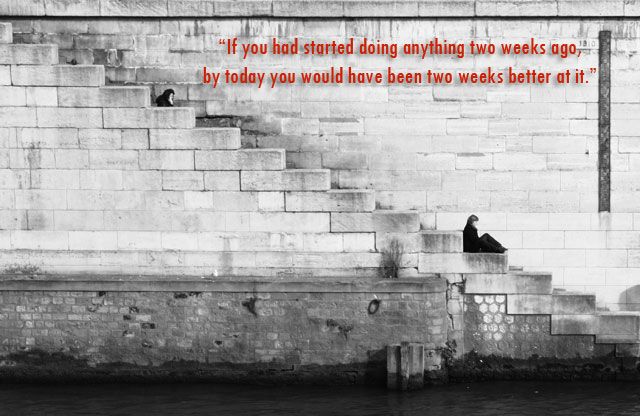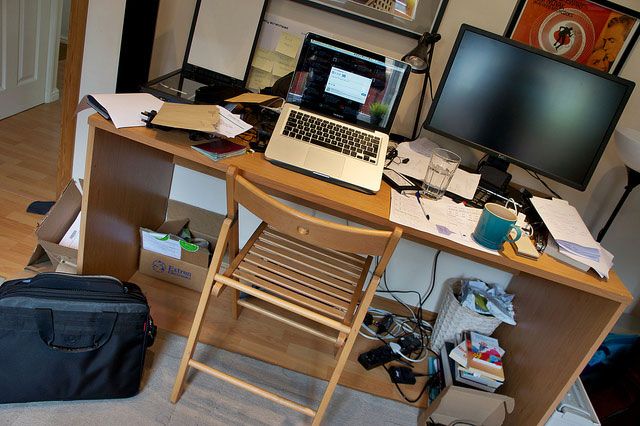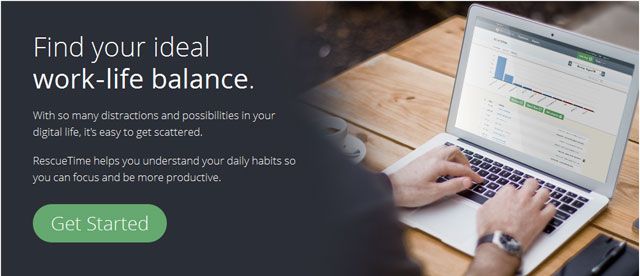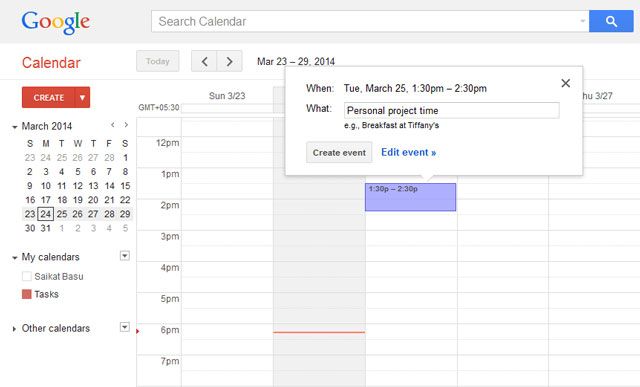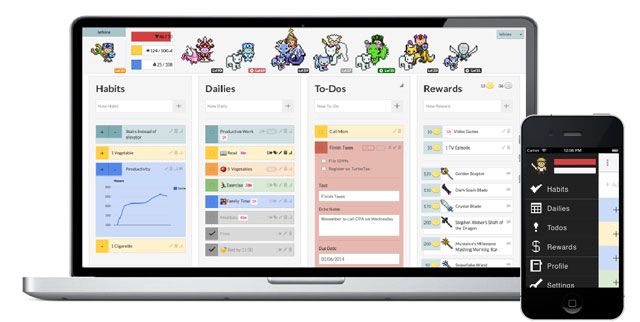Lisa Sugar worked in advertising but loved celebrity gossip.
Ray Chen was a university student who just wanted to share funny images.
Craig Newmark was new to San Francisco and worked for a brokerage and banking company.
These three sound like everyday people. They also created little websites -- PopSugar, 9GAG, and Craigslist in that order. These were all personal projects of the three founders while they were busy earning their bread doing something different. Dig deeper. You will find many success stories that came from following large passions with tiny first steps.
Do you have a passion that is secretly throbbing inside your head? Even an idea? What is holding you back? Maybe, the clock runs out after a grueling 10-hour workday and an hour of commute. I know the feeling. I have been there. In many ways, I am still there like you. Let's not make that an excuse anymore. Let's steal some time.
Make It Personal
Start today. Make a personal commitment.
A personal commitment will flow from passion. Passion is the sauce that will keep your energy on simmer. Bring the passion you have for a hobby to your personal project or turn your hobby into a long-term personal project. If you persist with your hobby today, the Web can help you earn from it tomorrow. As we have seen, the Web makes it so easy to start a hobby for fun.
Keep taking baby steps – it solves the conundrum of time and fear of failure. Think big, but start small. Joel makes an excellent case for this old maxim with tips on how to start a creative project.
Get Organized
It's the lynchpin for productivity.
They say a creative's desk looks something like the one above. I think it's a recipe for wasted time. We spend 30 percent of our time looking for things. That's why someone invented the filing system. Start by organizing the tools needed for your side project. If it's digital, spend a day organizing your computer. Any personal project will require an information gathering routine. Aaron proposed some standout research tools. Hit Pinterest for some desk organization ideas.
Spend Some Time To Save Some Time
Time comes with an opportunity cost.
Last year, NBER published a research paper that showed the amount of time Americans spent online. Business Insider gave the story a frame by saying –
Extra time online comes at a cost to other activities. That makes it exceptionally difficult to figure out how much of our time on the Internet boosts productivity versus sapping it.
NBER tracked the patterns using a Time Use Survey from 2003 – 2011. You don't need to track your time spent (and wasted) over such a long span. You can use simple software like RescueTime (our review) or Toggl to find out for yourself. The point is – a lot of minutes and hours slip between the cracks. Some of which we can easily divert to our personal projects. Even twenty minutes a day adds up after a month.
If you are a frequent air traveler or commuter, then all those miles can easily translate into some productivity with the help of digital tools like smartphones, tablets, a podcast app...or just the brain for cooking up ideas and to-dos.
Carve It On A Calendar
Commit the personal project to the calendar.
A calendar is the only "time machine" we have. A calendar overview helps us "see" the future and free time for personal projects. Take to a calendar schedule and take up the well-advised time management idea of following rituals in your life. Rituals are time savers simply because they put you on autopilot for the things you do every day. You don't have to waste time on thinking what to do next. If rituals are the structure, a calendar can be the tool. Create a personal strategic plan for your project and use the calendar to set up the waypoints that get you from launch to landing.
A calendar can be a huge time-saving device with all the automated tasks you can put on it. Read about these nine IFTTT hacks to superpower your life with Google Calendar.
Gamification When Self-Motivation Flags
Think play. Think fun.
It's the rage. If gamification can be used for fitness, it can easily be used as a spark plug for personal projects. I am sure you have never been tired of playing video games after a busy day or catching a movie. Justin tried productivity with gamification. His game of choice was HabitRPG and he is still using it. When you make productivity about rewards, it can help you level up for your personal projects.
Tune It Into Your Everyday Work
If it's a labor of love, you can do it.
Tina Roth Eisenberg stresses on the importance of not only investing ourselves in side projects but also trusting in them. She is a mother and a wife, but she is also known as the "queen of accidental businesses". Watch the Do lecture, it is very inspiring.
Writing this blog post is a perfect example of inserting some bits of a personal project into my everyday work. It is helping me think strategically about my own personal project, while I also publish this post for MakeUseOf. You too can merge your learning or practical experience with your day job. You could be learning coding best practices in college, and using that for a side project. You could leverage a business problem into a side project that solves it for everyone. Instapaper came from the simple problem of not being able to read web articles on the go. It was a personal project for Marco Arment, while he was working for Tumblr.
The Time Value Of Outsourcing
Estimate your time in terms of efficiency.
Your personal project may not require it. Outsourcing is a great way to free up time for your personal projects. These days, you can outsource everyday tasks like laundry, cooking, shopping, financial accounting, making a business presentation etc. and actually get more than 24 hours a day. You can find local help on sites like Craigslist or go for remote with sites like Fiverr or any of Fiverr alternatives.
Network With Like-Minded Minds
Collaborate for endless possibilities.
Twitter came from the failure of Odeo. We know it was Jack Dorsey's side project, but it wasn't a single-man operation by any stretch. Collaborating with others also accelerates your personal projects, and frees up time for tasks you can focus on. Crowdsourcing and collaborative communities make it easy to find like-minded people who can help you bring you passion to life. Go to r/sideproject on Reddit where people are talking about their side projects and discussing ideas. Working or even discussing it gives every project a dose of commitment and makes it feel more real.
Lack of funds? Collaborate with the global community on Kickstarter, Indiegogo, and RocketHub. If nothing else, you can share your personal projects through social media or a blog. However, not every project needs to be shared publicly.
Never Stop Capturing Ideas
An idea in time saves time.
I have a swipe file in Evernote for capturing ideas, life hacks, time management tips, keyboard shortcuts, and whatever else that helps me become more productive. Ideas that help my personal project go an inch further also find a place. Capturing ideas almost daily helps me to keep my the idea of my personal project front and center. I may not make progress on the main project every day, but if I can capture a microscopic idea on it, I call it a fulfilled day. Don't depend on your memory. Note it. Store it. You can engineer a universal tool like Google Drive to capture and ferment your ideas.
Give It Time
Remember, the tortoise won the race.
A personal project usually isn't about money. If we make it about the process we take the high stakes out of it. Personally, I am not looking for perfection. It's just the joy of creating something from scratch. I know I will learn a lot from my failures. A little work on my personal project makes the day worthwhile even if all that came before it was waste. One day, I probably won't even put it on my to-do list...but just do it.
This post came to be because of this excellent post by Paul Jarvis. He talks about treating your side projects as experiments. He says self-projects can seem intimidating and the fear of failure stops us in our tracks.
To get over my own fear of failure with them, I started picturing these ideas as simply being experiments. Experiments don’t "fail"— they simply prove or disprove a hypothesis.
Tell Us About Your Personal Project
If you are among the few who recharge your tired mind with a personal project, then you are among the lucky ones. If you are not, then it's about time you put your creative goggles on and thought up a personal project. Do you have one? How do you find time for it? Do share your personal project with us if you want, and any tips that you use to eke out time in the midst of a busy day.
Image Credit: dougbelshaw; Business Hand (Shutterstock); Group of businessman (Shutterstock); Business Mind (Shutterstock); vancouverfilmschool


